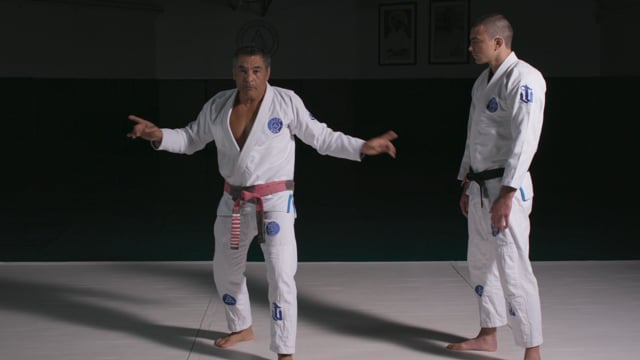In old times where Brazilian jiu-jitsu was still vying for its space -- 1965, more specifically -- the Brazilian journalist José Inácio Werneck published an article with this curious, attention-grabbing title: “Abel died due to not knowing self-defense.”
Hard to tell whether Cain would have managed to hit Abel with that rock if his brother were a black-belt, but it’s safe to say the victim of the first big crime in the Bible would have been better prepared to survive the attack.
Between the times of Cain and Abel and now, much has changed in this little paradise of ours, and the reader probably doesn’t count among their biggest fears that of being ambushed in a forest. But then, why does self-defense practice remain so useful, even for students not employed in security or similar jobs?
Again, Master Rickson teaches us that the study of jiu-jitsu in the face of aggression, or even weapons, is much more beneficial to the mind than to saving one’s skin.
“A situation of confrontation against an aggressor, or an armed person, is the worst of scenarios in anyone’s life, and it’s not something you should expect to occur one day,” he says. “Even so, there are priceless benefits to adopting this constant training. After all, learning to control an armed person, or acquiring the skill to disarm someone, will amplify your knowledge about grips, reaction time, precision and adjustments of the moves. The person who practices self-defense becomes a martial artist with a much broader vision and much more complete technical baggage. And, in case of a terrible eventuality, you will have more experience to come out unscathed.”
Safety, experience, instinct, by the looks of it, are much more connected than we think. So taught another master, the author Agatha Christie. There is one case handled by her detective, Hercule Poirot, in which no crime has happened (yet), and all there is is a vague letter, unsigned, that nobody from the police takes seriously. Asked by his loyal companion whether his suspicion came just from his own instinct, the Belgian detective answers:
"Not instinct, Hastings. Instinct is a bad word. It is my knowledge—my experience—that tells me that something about that letter is wrong—"
Hard to tell whether Cain would have managed to hit Abel with that rock if his brother were a black-belt, but it’s safe to say the victim of the first big crime in the Bible would have been better prepared to survive the attack.
Between the times of Cain and Abel and now, much has changed in this little paradise of ours, and the reader probably doesn’t count among their biggest fears that of being ambushed in a forest. But then, why does self-defense practice remain so useful, even for students not employed in security or similar jobs?
Again, Master Rickson teaches us that the study of jiu-jitsu in the face of aggression, or even weapons, is much more beneficial to the mind than to saving one’s skin.
“A situation of confrontation against an aggressor, or an armed person, is the worst of scenarios in anyone’s life, and it’s not something you should expect to occur one day,” he says. “Even so, there are priceless benefits to adopting this constant training. After all, learning to control an armed person, or acquiring the skill to disarm someone, will amplify your knowledge about grips, reaction time, precision and adjustments of the moves. The person who practices self-defense becomes a martial artist with a much broader vision and much more complete technical baggage. And, in case of a terrible eventuality, you will have more experience to come out unscathed.”
Safety, experience, instinct, by the looks of it, are much more connected than we think. So taught another master, the author Agatha Christie. There is one case handled by her detective, Hercule Poirot, in which no crime has happened (yet), and all there is is a vague letter, unsigned, that nobody from the police takes seriously. Asked by his loyal companion whether his suspicion came just from his own instinct, the Belgian detective answers:
"Not instinct, Hastings. Instinct is a bad word. It is my knowledge—my experience—that tells me that something about that letter is wrong—"
Train your instincts, accumulate experience, and live safer.

Comments
Abel was most likely struck from behind. It would seem like Abel would have been naive and trusting as well to think that his brother would never had hit him from behind. I guest the statement made by Jesus, "who is my brother..." would apply as well??? Regardless, of being a black belt or not. A blow to the back of the head is fatal to anyone who lets down their guard. I think most black belts in JJ are not naive in the thought of letting down their guard but so are many martial artist and people in security or military.
So to develop the instinct to intuit danger.